20 Ways to Have a More Positive Body Image

Age 6: That's how early young girls begin to express shape shame. Before junior high, at least one-third of boys and one-half of girls have turned to dangerous methods (such as skipping meals, smoking, or vomiting) to try to lose weight, according to the National Eating Disorders Association.
So it's no wonder nearly every American adult struggles with body image. "Many of my clients will admit—with tears in their eyes—how hard they are on themselves for not following their idea of a perfect diet or having an Instagram-perfect life," says Adrienne Raimo, RD, a holistic health and wellness coach at One Bite Wellness in Columbus, Ohio. "They feel like their bodies are betraying them by not looking like they 'should.'"
At that moment, Raimo focuses on helping her clients see themselves first as they really are, then aims to change their mindset to focus on the quality of life rather than quantity of pounds. Whether you're a gym devotee or an almost-never-exerciser, learn how to end the body battle for good. Focus on non-scale victories, our pros recommend. And try these top 20 tips for how to have a positive body image to change the way you feel about your figure.
Think: Two ups for every down
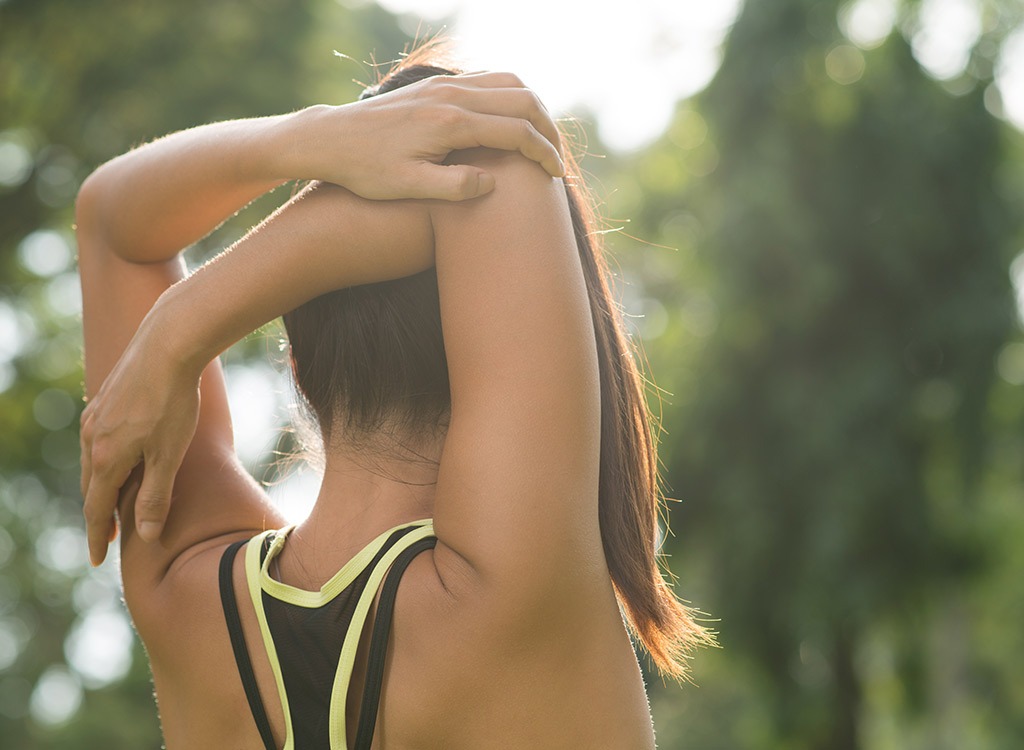
"Ugh, my thighs are as lumpy as cottage cheese." "My upper arms are so jiggly, I don't even wave anymore!" Sound familiar? We are all-too-quick to criticize ourselves for our perceived faults but rarely affirm our awesomeness.
"Would you say the same horrible things you say to yourself to your daughter, sister, or best friend? Remember that you are, or should be, your own best friend. Treat yourself accordingly," Raimo says. The first step to halting this habit is identifying the negative, body-shaming statements throughout the day and tracking how common they are, says Abby Olson, RD, owner of Encompass Nutrition in St. Paul, MN.
Once you observe that negative voice rearing its head, counter it with two compliments for every put-down. "If you can't find something positive about your body initially, then find something positive about yourself as a whole—or even start by thinking something positive about life in general," Olson says. This will help you establish a new pattern when those negative thoughts are triggered. Something as simple as "I'm grateful for my strong legs that climbed the stairs this morning" or "I'm blessed to have a comfortable bed to sleep in after a busy day" will do the trick.
Rock the jeans that hug your curves
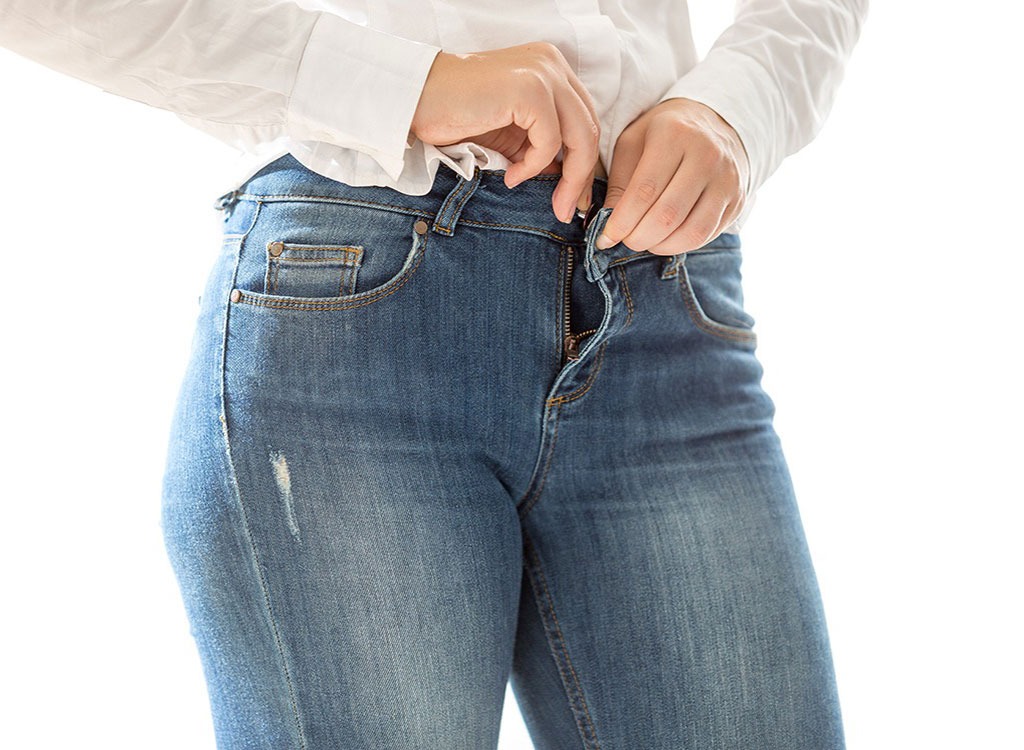
Put down the oversized sweatshirt from 13 years ago. Apparel that fits the Goldilocks mold (not too large; not too small) is best for a body image boost, according to Bonnie Brennan, MA, LPC, CEDS, regional managing director-clinical at the Eating Recovery Center in Denver, Colorado.
"Wear comfortable clothes and things you feel good in! Outfits that are too constricting or too big will remind you of your body and draw your attention back to the areas you may feel negative about," she says.
At the same time, keep in mind Raimo's words of wardrobe wisdom: "Wearing a giant tent of a T-shirt and stretchy gym pants can be part of a 'depression uniform.' By wearing a fashionable outfit and highlighting your favorite features, you start feeling better about yourself. That often leads to wanting to do better for yourself—making a healthier choice, for example—which can lead to looking better."
Hit the mat
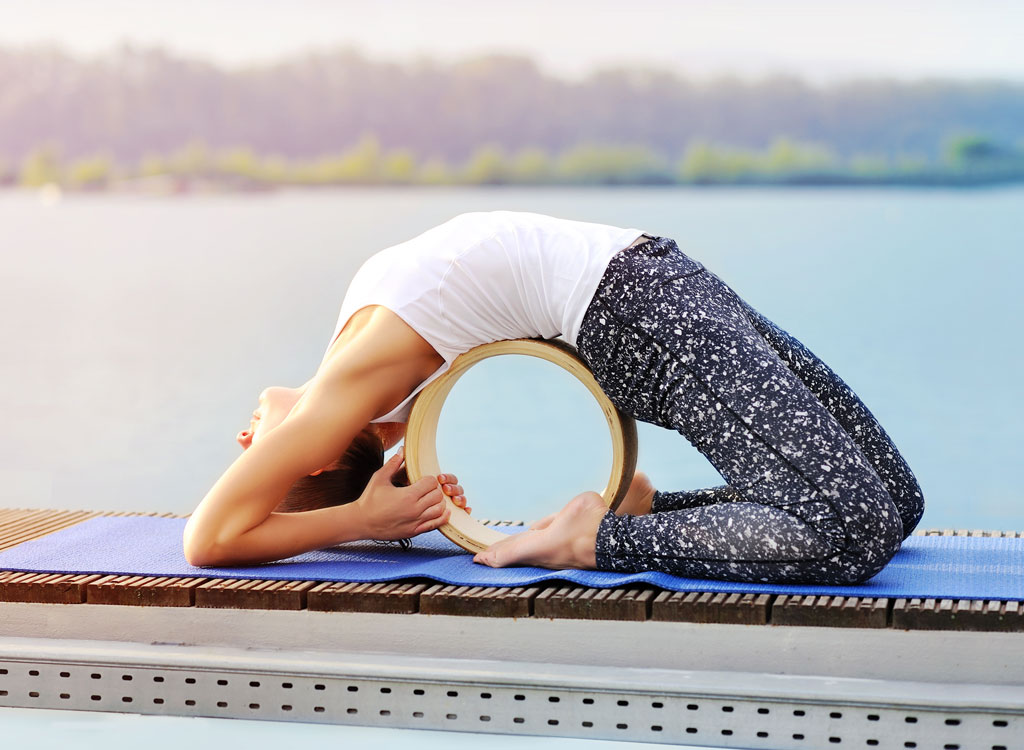
When you're feeling down, fold into a downward dog. Practicing yoga has been linked to an increase in body satisfaction, particularly for those who struggle with body image issues, according to a study published in the journal Body Image.
While you bend and stretch, keep Raimo's affirmations in mind: "Every cell in your body is working to keep you alive and well. It's your ally—not enemy. Why are you at war with it? You are worthy of nourishing yourself with proper nutrition, body movement and time for self-reflection."
Move for fun, not for punishment

Speaking of working out, if crunching through the calories is your end goal, it's time to make a U-turn. "Find exercise to do for fun," Brennan says, whether that's swimming, dancing, walking your dog, or cycling.
"Movement can be joyful and can celebrate living, but often we exercise for the sole purpose of burning calories or changing our body," Brennan says. "Seek out an activity that makes you feel joyful and free while you do it."
Think about all your body helps you accomplish
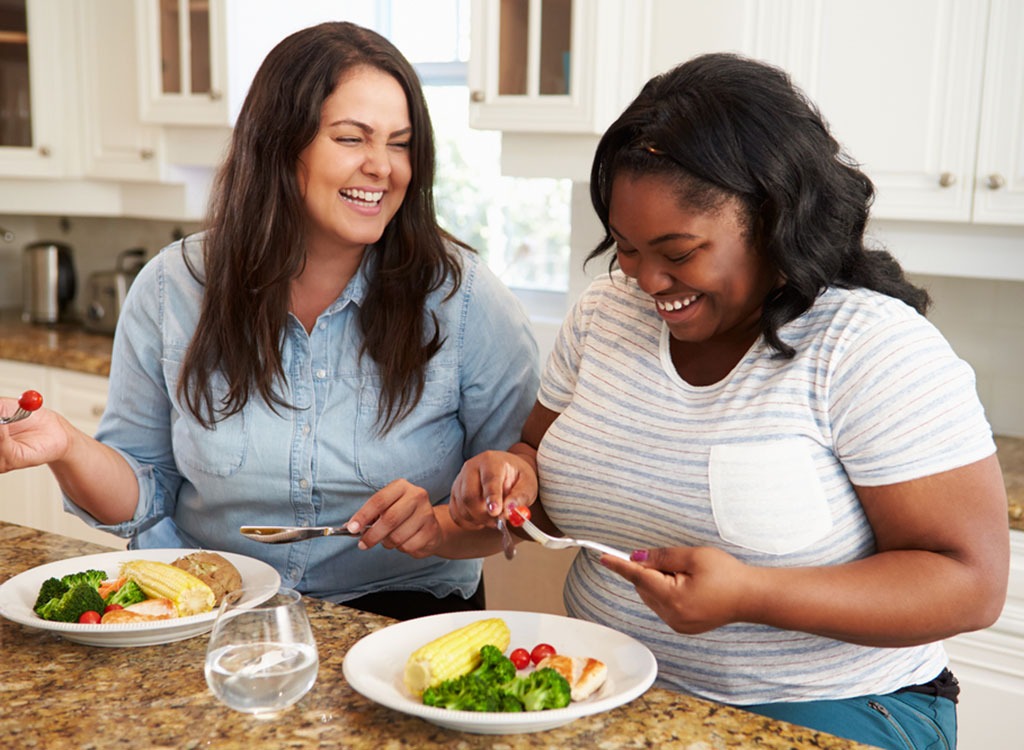
Don't forget the many miracles your bits and pieces help you accomplish each day. From eyes that can watch stunning sunsets to fingers that can type a loving text to a friend who's struggling, Raimo advocates looking at all your body does…not just looking at how it looks. "What attributes or character traits do you admire about yourself? Perhaps you make others laugh, or maybe you're a great leader, paddleboarder, or French cook. Sometimes appreciating the beauty inside helps us connect with it on the outside," she says.
Embrace your inner child

Flashback to that pre-six-year-old, pre-diet mindset self. "Treat your body like a baby. Honor your body's needs and act accordingly. Eat when you're hungry, sleep when you're tired. Give yourself permission to not always push to the extreme," Raimo says. Remember that fascination with ladybugs or the joy from finding an extra animal cracker hiding in the bottom of the bag? Try to rediscover the little joys of childhood when you're in a critical cycle.
Take a social media hiatus

Say "farewell" to Facebook for a nearly instant image boost, Brennan suggests. "While social media has many helpful aspects, it also can take one down a rabbit hole of self-hate. Especially harmful are thinspiration, fitspiration, and pro-anorexia or pro-bulimia sites. Plus, fat-shaming is rampant," she says. If you can't (or don't want to) go cold turkey, set a goal to limit use to 15 minutes a day to check in on Instagram, Snapchat, and other social sites. If you begin to feel bad about yourself before the 900 seconds are up, close the app.
Head outside

Fresh air and green surroundings make all the difference. Take a walk outside (nope, the indoor track doesn't count here) and you'll experience greater body satisfaction, according to another study published in Body Image. Grab a friend, bring your pup, or simply soak up the sounds of the chirping birds by yourself. Set a calendar event if you need a reminder to take the extra steps a routine.
Embrace your quirks

Remember the joy you had in your body and all it could do before you realized others were thinking about you and before you had an idea of societal expectations? What did you love most about yourself? It's time to acknowledge and accept those things again. "Part of your job as a human is to accept yourself—perceived 'weirdness' and all. Own your unique sense of humor and mannerisms as a strength," Raimo says.
Reframe the word "fat"
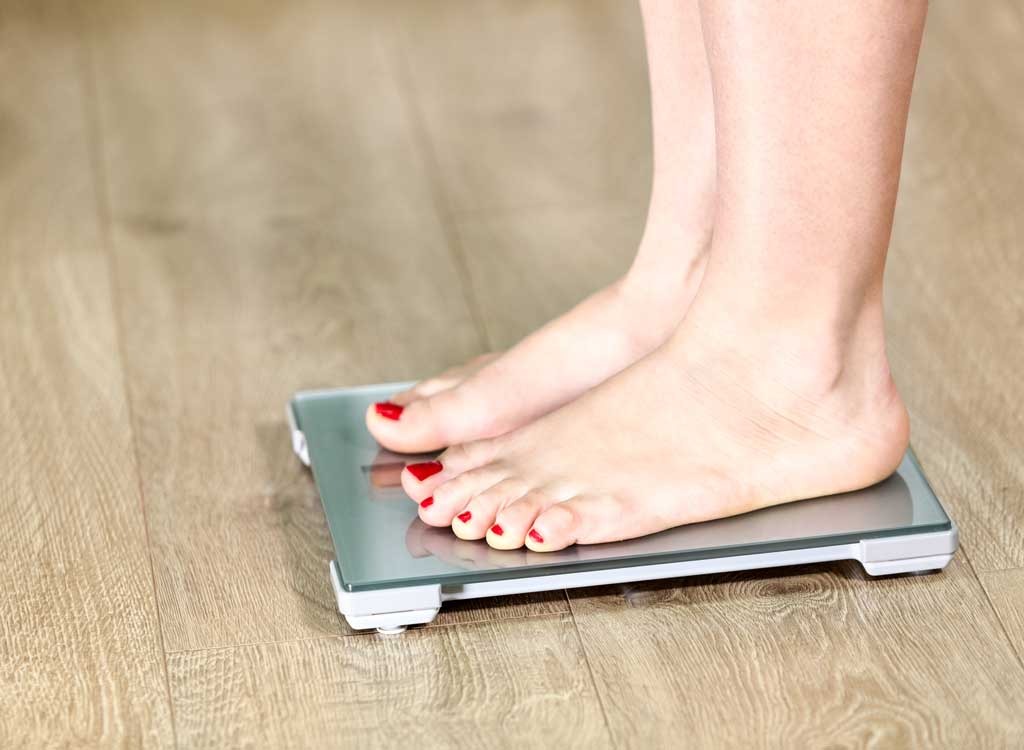
Fact: "Fat" is not a feeling. "Many of us use the word 'fat' to describe an emotional state. Practice using words to describe your feelings that are not about your appearance," Brennan says. Instead of "I feel so fat after lunch," dig in and pinpoint your real emotions, such as "I'm worried that other people will be critical about me at my afternoon meeting."
Write a love note to yourself

You've likely done it for your mom and for your significant other. Now it's time to do the same for yourself. "Catalog the qualities you adore about yourself and keep this letter or list handy for days when you're feeling less-than-stellar," Raimo says.
Olson ups the ante by asking her clients to make this practice repetitive. "Write something positive about yourself and your body down every day," she says. "Keeping an ongoing list will allow you to build and develop a new mindset as to how you see yourself and feel about yourself." For an added benefit, read your list out loud or share it with friends or family. This makes the thoughts more real, Olson says.
Give yourself permission to have an "off" day

No one expects you to feel as confident as Nicki Minaj every single day. "Allow yourself to have difficult thoughts and feelings without feeling like you need to solve them or fix them right at that moment," Brennan says. Divert yourself to something else, if needed (some good options are to take out your journal or to give your BFF a call), and focus your energy and time on the things that are valuable and meaningful in your life.
"The more you invest in things that take you towards a life worth living, the more distance you will get from using your body as an object to control," Brennan says.
Take note of your triggers
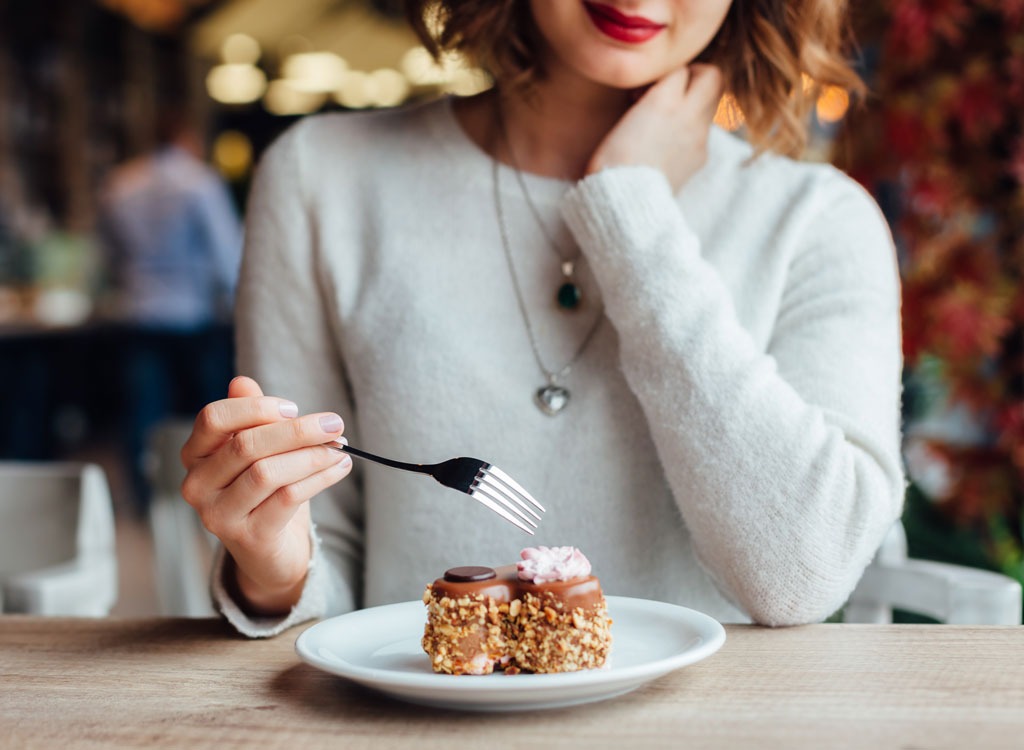
It will be much easier to put the kibosh on the criticism when you can stop it before it's out in full force. Take note of how and where you feel emotions in your body. Do you get a lump in your throat when you're sad? Maybe you experience a knot in your stomach when you're nervous? "Understanding the connection to emotional states and triggers to negative body image is a big step toward understanding when you might be most vulnerable to engage in focusing on negative body thoughts," Brennan says.
Skip the shame cycle

Accept yourself where you are today. It's nearly impossible to motivate yourself to make self-improving decisions from a place of guilt and shame. "If we can come from a place of loving and appreciation of our bodies no matter where we are at in the goal-setting and achieving process, we have a stronger desire to take care of ourselves," Olson says. "Health and appreciation can more easily become the priority."
Be aware of the challenging environment you're in

All our experts admit it: This won't be easy. None of these massive mindset changes happen in a silo. "We don't ask people with alcohol use disorder to recover in a bar and develop a healthy relationship with alcohol," Brennan says. It's pretty monumental when people in Western culture can conquer their body image battles at all, she continues, while being surrounded by advertisements with stick-thin models and books about the next greatest diet fad that's "guaranteed" to work this time.
"There's so much advice out there in apps, blogs, books, fitness programs, and more about how to change your body and the food you put in it. We place a high value on appearance in our society, which leads one to scrutinize any negative perception and want to change it," Brennan says. If you find that certain surroundings, gurus, and media sources trigger critical thoughts and emotions, take a respite and take note of your vibe. Feel better on the whole? Reconfigure your environment accordingly.
Give yourself permission to accept your body
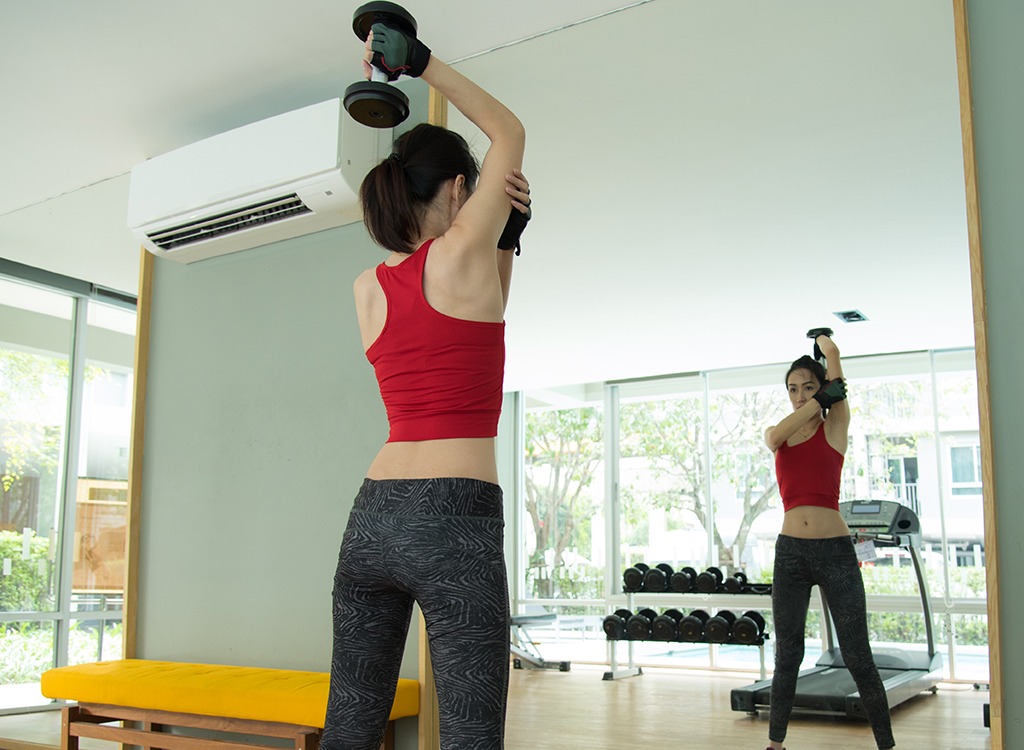
It may sound easy, but this is one of the toughest missions of all. It's okay to be okay. "Confidence in yourself and [your] body isn't arrogance. They are different," Raimo says. "There's a lot of value in changing behavior so that we feel confident in who we are and how we feel about ourselves."
Consider the scientific side

And if all these psychological swaps aren't helping, veer toward the physiological. Examine what the body does from a scientific perspective. "Do a body scan from toes to head and, without judgment, note what each body part or system does for you. For example, 'my stomach digests food to nourish my body and lets me know when I may have an illness.' This will help you recognize all the amazing features you have that are completely outside the appearance focus," Brennan says.
Go spiritual
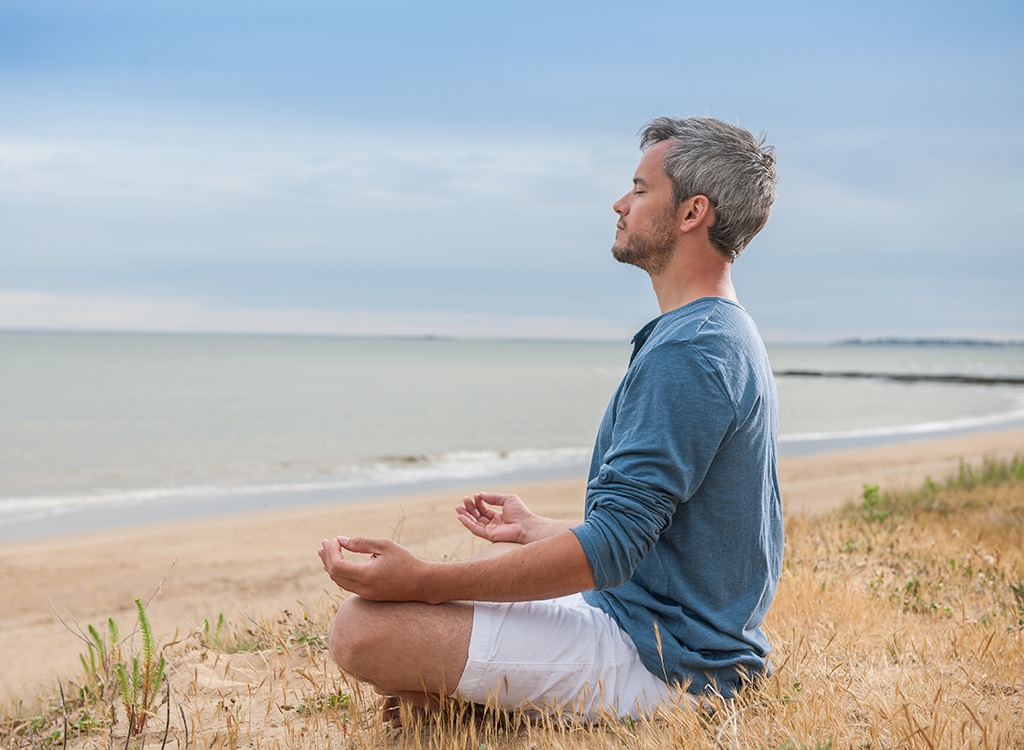
"Some of my clients respond well to a reminder that their bodies are the temples of their spirits," Raimo says, explaining the benefits of thinking big(ger than yourself). "Others respond well to an analogy of their body being like a fancy car. In both cases, I ask how they would treat such objects and, therefore, how they could show their bodies the same respect and reverence." Rather than picturing your body as an object to be controlled, "practice awareness of your body as part of you, a source of wisdom and a vessel for the self," Brennan says.
Be thankful

What do you appreciate about this day? Your life? Your body? Brainstorm three or more things you're grateful for to flip that frown. When it feels like you're your own worst enemy and can't stop nitpicking, "keep a gratitude journal to give thanks to the things your body helped you with or did for you that you are grateful for," Brennan says.
Brainstorm what your 80-year-old self might think

When you're playing with your great-grandkids, will you really be fussing over the little extra padding around your hips? You'll probably look at photos of your present-day self and think, "Dang, I was hot stuff back then!" Aim to channel that confidence here and now. If all else fails, follow Olson's advice. "Imagine how your loved ones think of you and know you can get through this day because of who you are and what you have worked so hard to accomplish and overcome," she says.
Armed with these tips on how to have a positive body image, you can crush the year ahead.








